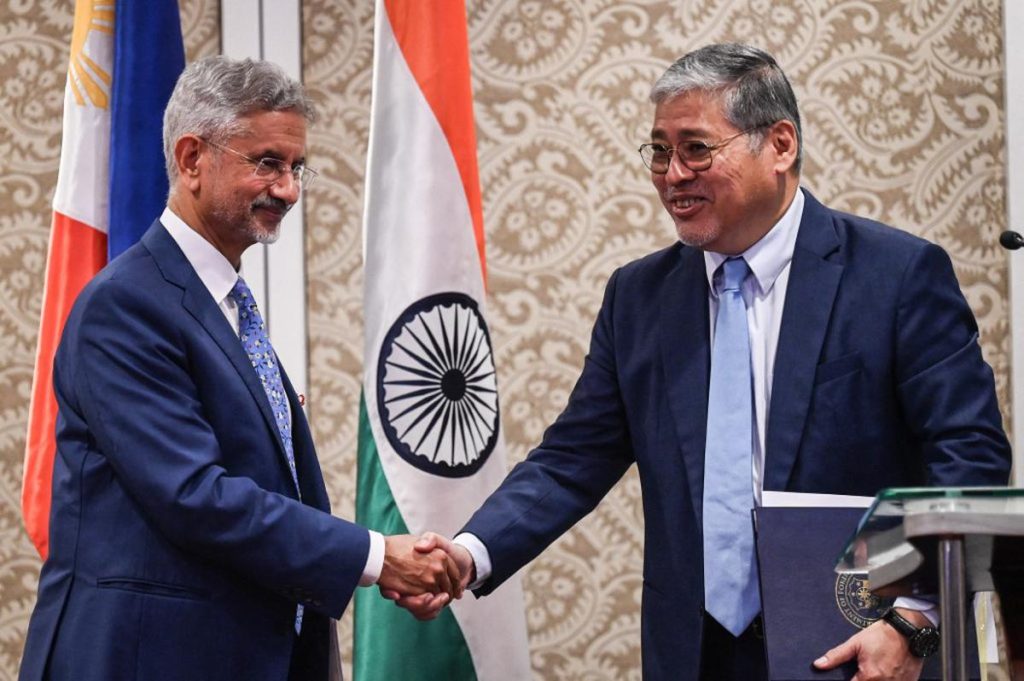
MANILA/New Delhi: Amid heightened Manila-Beijing tensions over the South China Sea, India’s External Affairs Minister S. Jaishankar has expressed support for national sovereignty of the Philippines – a message to China to curb its expansionist ambitions.
“I take this opportunity to firmly reiterate India’s support to the Philippines for upholding its national sovereignty,” Mr Jaishankar told journalists in Manila, the second leg of his three-nation tour of ASEAN countries. This assertion underscores India’s commitment to standing by its allies in the face of territorial aggression by China.
In a joint press conference with his counterpart Enrique A. Manalo, held in the capital city Manila, on March 26, Mr Jaishankar emphasized the importance of closer cooperation between India and the Philippines in shaping the emerging global order. “As the world changes, it is essential that India and the Philippines cooperate more closely to shape the emerging model. Every country has the right to uphold and enforce its national sovereignty,” he said in response to a question. This statement reflects India’s recognition of the evolving geopolitical landscape and the need for collaborative efforts to address shared challenges effectively.
”As a nation deeply invested in this region because of its Act East policy and Indo-Pacific vision, India follows all developments with great interest. We are strongly supportive of ASEAN’s centrality, cohesion and unity. We are also convinced that the progress and prosperity of this region is best served by staunch adherence to a rules-based order. UNCLOS 1982 is particularly important in that regard as the constitution of the seas,” he said.
There has been very perceptible growth in bilateral ties between India and the Philippines recently, the minister stressed.
In his talks with his counterpart Enrique A. Manalo, Mr Jaishankar also focused on exploring new areas of cooperation, including in defence and security.
“Warm and productive meeting with @SecManalo of Philippines. Wide-ranging discussion on advancing ties in political, defence, security & maritime cooperation, trade & investment, infrastructure, development cooperation, education, digital, technology, culture and consular domains,” Mr Jaishankar posted on X.
The two ministers also exchanged views on global, regional and multilateral issues including the Indo-Pacific, Association of Southeast Asian Nations (ASEAN), West Asia, Ukraine, Non-Aligned Movement and the UN.
“As two democracies committed to a rules-based order, look forward to intensifying our cooperation,” he said.
The South China Sea remains a hotbed of tension as territorial disputes persist between nations, particularly China and the Philippines. Recent clashes between ships from both sides have escalated tensions, with Manila describing them as one of the most serious incidents yet. The incident took place near Second Thomas Shoal in the Spratly Islands during a regular Philippine mission to resupply Filipino troops garrisoned on the BRP Sierra Madre, a grounded navy ship. Manila has accused Beijing of using water cannons on civilian boats and claiming its dominance over the shoals there, which the Philippines consider to be part of their economic zone.
On March 25, deputy foreign ministers from China and the Philippines engaged in discussions following Manila’s strong protest against the aggressive actions of the China Coast Guard and Chinese Maritime Militia. Against this backdrop, India has reaffirmed its unwavering support for the Philippines in upholding its national sovereignty.
India’s reaffirmation of support for the Philippines is indicative of the deepening bilateral ties between the two nations. The Philippines awaits the first deliveries of the BrahMos missile systems from New Delhi under a $375 million deal. The increasing defence cooperation between the two countries has just begun as they support a “free and open Indo-Pacific for all.”
“India and the Philippines have a deep interest in a free and open Indo-Pacific. It is in this context that we are having regular discussions on security and defence,” said Mr Manalo.
As the South China Sea dispute continues to unfold, India’s stance underscores the importance of upholding principles of sovereignty, international law, and peaceful resolution of conflicts. By standing with the Philippines, India reinforces its commitment to fostering stability and security in the Indo-Pacific region while promoting a rules-based international order.
(Deepakshi Bhardwaj contributed inputs for this article)
Author Profile
- India Writes Network (www.indiawrites.org) is an emerging think tank and a media-publishing company focused on international affairs & the India Story. Centre for Global India Insights is the research arm of India Writes Network. To subscribe to India and the World, write to editor@indiawrites.org. A venture of TGII Media Private Limited, a leading media, publishing and consultancy company, IWN has carved a niche for balanced and exhaustive reporting and analysis of international affairs. Eminent personalities, politicians, diplomats, authors, strategy gurus and news-makers have contributed to India Writes Network, as also “India and the World,” a magazine focused on global affairs.
Latest entries
 DiplomacyJanuary 5, 2026India walks diplomatic tightrope over US operation in Venezuela
DiplomacyJanuary 5, 2026India walks diplomatic tightrope over US operation in Venezuela India and the WorldNovember 26, 2025G20@20: Africa’s Moment – The Once and Future World Order
India and the WorldNovember 26, 2025G20@20: Africa’s Moment – The Once and Future World Order DiplomacyOctober 4, 2025UNGA Resolution 2758 Must Not Be Distorted, One-China Principle Brooks No Challenge
DiplomacyOctober 4, 2025UNGA Resolution 2758 Must Not Be Distorted, One-China Principle Brooks No Challenge India and the WorldJuly 26, 2025MPs, diplomats laud Operation Sindoor, call for national unity to combat Pakistan-sponsored terror
India and the WorldJuly 26, 2025MPs, diplomats laud Operation Sindoor, call for national unity to combat Pakistan-sponsored terror







